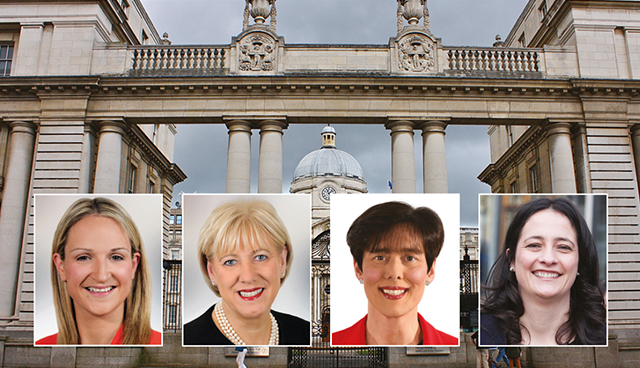Cabinet formation: “A missed opportunity”

The not-for-profit organisation Women for Election has called the formation of the Cabinet of the 32nd Government of Ireland “a missed opportunity” after just four women were appointed to the three-party executive.
The four women named to the Cabinet are: Helen McEntee of Fine Gael as Minister for Justice; Norma Foley of Fianna Fáíl as Minister for Education; Heather Humphreys of Fine Gael as Minister for Social Protection and for Community and Rural Development and the Islands; and Catherine Martin of the Green Party as Minister for Media, Tourism, Art, Culture, Sports and the Gaeltacht. Two further women are attending Cabinet as Ministers of State: Pippa Hackett of the Green Party as Minister of State for Land Use and Biodiversity; and Hildegarde Naughton of Fine Gael as Minister of State for International and Road Transport and Logistics.
The number of four female ministers marks neither progress nor regress for female representation at the Cabinet level, rather it is statis as there were also four women ministers in the Cabinet of the 31st Government. “It is disappointing that once again a government have missed the opportunity to appoint a balanced cabinet,” Women for Election CEO Ciairín de Buis said. “There has been a total of 22 women who have been appointed to cabinet since the foundation of the State. That’s not good enough.”
From the foundation of the Republic in 1937, Ireland has had 32 governments, but it wasn’t until the 16th Government, formed by Charles Haughey in 1979 after the resignation of Jack Lynch, that a woman was appointed to Cabinet. Máire Geoghan-Quinn, a Fianna Fáil TD, was appointed Minister for the Gaeltacht, making her the first woman to hold an Irish cabinet post since Constance Markiewicz served as the Minister for Labour in the Government of the First Dáil.
The 33rd Dáil contains both the largest number and proportion of women TDs in the Dáil’s history, both pre- and post-foundation of the Republic, with 36 out of a total 160 TDs accounting for 22.5 per cent of those taking their seats in Leinster House. The three governmental parties, Fianna Fáil, Fine Gael and the Green Party, account for a total of 84 TDs, but only 13 of those are women, immediately putting a severe limit on the proportion of women likely to be appointed to Cabinet.
The proportion of just 15.5 per cent of TDs being women across the three coalition parties places them at an immediate deficit, being lower than the overall Dáil proportion of 22.5 per cent, and significantly lower than the Opposition’s proportion of 30.2 per cent, made up by 23 women TDs among the 76 non-government affiliated TDs.
“It isn’t enough to say there aren’t enough women in the Dáil to appoint a balanced cabinet,” de Buis said. “This isn’t inevitable, it’s not like the sun setting every evening – there aren’t enough women in the Dáil because of systematic barriers to their full participation in Irish political life. We need political leadership to see change across all levels of politics – this was a missed opportunity to see more women at Cabinet level.”





